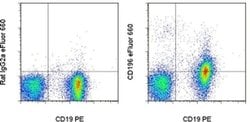Learn More
Invitrogen™ CD196 (CCR6) Monoclonal Antibody (sirx6), eFluor™ 660, eBioscience™
Rat Monoclonal Antibody
Supplier: Invitrogen™ 50719682

Description
Description: The sirx6 monoclonal antibody reacts with mouse CD196 (CCR6). CD196 is a seven transmembrane G protein-coupled receptor expressed on T, B, dendritic, NK and Langerhans cells. This CC chemokine receptor uniquely binds MIP3a/CCL20, a chemoattractant for dendritic cells, effector/memory T cells, and B cells. CD196 is also involved in host defense and inflammation at epithelial sites. Furthermore, this receptor has been implicated in Th17 differentiation and CD4+FoxP3+ regulatory T cell development. Due to expression characteristics of some chemokine receptors (shedding, surface cleavage or intracellular cycling), we recommend a fixation step after surface staining. Refer to Applications Tested for more information. Applications Reported: This sirx6 antibody has been reported for use in flow cytometric analysis. Applications Tested: This sirx6 antibody has been tested by flow cytometric analysis of mouse splenocytes. Cells are surface stained, then washed with Flow Cytometry Staining Buffer, immediately fixed with IC Fixation Buffer for 20-30 minutes, and then washed with Flow Cytometry Staining Buffer prior to analysis. This can be used at less than or equal to 1 μg per test. A test is defined as the amount (μg) of antibody that will stain a cell sample in a final volume of 100 μL. Cell number should be determined empirically but can range from 10^5 to 10^8 cells/test. It is recommended that the antibody be carefully titrated for optimal performance in t...
CCR6 is a member of the beta chemokine receptor family, which is predicted to be a seven transmembrane protein similar to G protein-coupled receptors. The gene is preferentially expressed by immature dendritic cells and memory T cells. The ligand of this receptor is macrophage inflammatory protein 3 alpha (MIP-3 alpha). This receptor has been shown to be important for B-lineage maturation and antigen-driven B-cell differentiation, and it may regulate the migration and recruitment of dentritic and T cells during inflammatory and immunological responses. Alternatively spliced transcript variants that encode the same protein have been described for this gene.
Specifications
| CD196 (CCR6) | |
| Monoclonal | |
| 0.2 mg/mL | |
| PBS with 0.09% sodium azide; pH 7.2 | |
| O54689 | |
| CCR6 | |
| N-terminal extracellular domain of mouse CCR6. | |
| 100 μg | |
| Primary | |
| Mouse | |
| Antibody | |
| IgG2a κ |
| Flow Cytometry | |
| sirx6 | |
| eFluor 660 | |
| CCR6 | |
| BN-1; CC chemokine receptor 6; C-C chemokine receptor type 6; C-C CKR-6; C-C motif chemokine receptor 6; CC-CKR-6; CCR6; CCR-6; CD196; chemokine (C-C motif) receptor 6; chemokine (C-C) receptor 6; chemokine receptor-like 3; CKR6; CKRL3; CKR-L3; Cmkbr6; DCR2; DRY6; DRY-6; G protein-coupled receptor 29; GPR29; GPRCY4; GPR-CY4; G-protein coupled receptor 29; KY411; LARC receptor; seven-transmembrane receptor, lymphocyte, 22; STRL22 | |
| Rat | |
| Affinity Chromatography | |
| RUO | |
| 12458 | |
| 4°C, store in dark, DO NOT FREEZE! | |
| Liquid |
The Fisher Scientific Encompass Program offers items which are not part of our distribution portfolio. These products typically do not have pictures or detailed descriptions. However, we are committed to improving your shopping experience. Please use the form below to provide feedback related to the content on this product.

